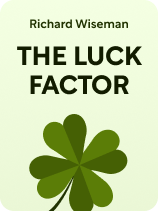

This article is an excerpt from the Shortform book guide to "The Luck Factor" by Richard Wiseman. Shortform has the world's best summaries and analyses of books you should be reading.
Like this article? Sign up for a free trial here.
Is it possible to learn how to be lucky? What can you do to turn around bad luck?
According to psychologist Richard Wiseman, it’s possible to manipulate luck in your favor. He shares that if you brighten your outlook, broaden your horizons, and learn to turn your luck around then better luck is more likely to find you.
Here are Wiseman’s tips on how to become lucky, from his book The Luck Factor.
How to Be Lucky
Want to know how to be lucky? Wiseman says they can if you incorporate strategies to improve your luck into your daily attitudes and routines. Throughout his recommendations, Wiseman emphasizes the power of your expectations to shape your reality. He says to experiment with different techniques, since different methods may work better for different people. The overall goal is to cultivate a more positive and expectant outlook on life, which—fingers crossed—might bring you good luck.
1. Brighten Your Outlook
To get the ball rolling on developing a positive attitude toward the future, Wiseman says to set realistic but ambitious goals for the short, medium, and long term. Achieving short-term goals will give you a boost toward your next rung on the ladder, and if “bad luck” gets in the way, you can turn short-term misfortune into a way to practice perseverance. Wiseman suggests that when faced with a setback, you can engage in lucky-minded thinking by weighing the cost of trying again—whether to double-down on your bet on yourself—against the benefits of your eventual success. You’ll often find that your short-term bad luck is tiny compared to the rewards of long-term persistence.
(Shortform note: Though Wiseman divides goals into three tiers, in When They Win, You Win, Russ Laraway adds a fourth—your ultimate aspiration. This is your overall purpose in life—a longer-than-long-term goal that might take decades to achieve, if ever—such as making the world a better place for your children. Though at any given moment, you’re probably working toward one of the short-term goals on your list, Laraway explains how the goals in each tier support the ones above it, with everything moving the needle on your aspirational goal in some way. When bad luck jams the gears on your short-term goals’ progress, your highest aspiration might be more motivating than even the long-term goals on your list.)
In addition to cultivating the belief that luck will eventually turn your way, Wiseman writes that you should adopt practices to boost your intuition. Since Wiseman’s research shows that lucky people often do so by engaging in meditation, finding quiet places, or taking breaks from problems to clear their minds, he suggests trying whichever of these methods appeal to you the most and observe the effects. Keep in mind these activities don’t produce immediate results—they require patience and become more effective with regular practice.
(Shortform note: Wiseman discusses meditation as a singular practice, but there are actually many different techniques you can engage in. The Master Guides: Choosing a Meditation Practice provides an overview of the most widely used approaches, from those associated with Buddhism, Hinduism, and Christianity, to more secular-oriented Western meditation practices. Regardless of which meditation style you select, you should start small with short meditation sessions, perhaps in conjunction with a class or support network, and—if quiet meditation is hard—try combining your practice with a low-intensity physical activity such as walking.)
2. Broaden Your Horizon
In addition to suggesting you adopt a forward-thinking perspective, Wiseman recommends taking concrete steps to increase your chances of lucky moments and encounters. The first is to build a larger personal network, like those of the lucky people in his study. One way is to deliberately initiate conversations with several strangers each week, whether in line at the grocery store, at meetings for work, or during social gatherings. You can also reconnect with people with whom you’ve fallen out of touch, if only to have a brief catch-up conversation. Most interactions won’t turn into strong connections, but the more you interact with other people, the more likely you are to luckily stumble into a valuable new contact or future lifelong friend.
(Shortform note: At the time of Wiseman’s writing, social media was in its infancy, though today it’s become the tool of choice for expanding your network in the digital age. In Never Eat Alone, Keith Ferrazzi explains how to leverage social media effectively. First, use direct messaging to make your connections more personal. Second, inspire social media users to approach you by creating content that piques people’s interest. No matter what type of content you create, make sure it reflects your authentic personality, not a fake social media version of yourself. That way, when you need your online network as a pool of potential lucky connections, people will connect with the real you and not your phony digital persona.)
Wiseman says that along with enlarging your social network, you should emulate lucky people by increasing your range of experiences. Every new interest, hobby, and aspect of life you explore increases your chances of lucky encounters that might benefit your career, your personal life, or open a window to opportunities you’d never considered. If you’re not sure where to start, Wiseman suggests that you literally roll the dice: Write a list of six things you’ve never tried and randomly roll for which one you’ll pursue. Make expanding your life into a game, and approach it with a child-like perspective, free from expectations. That openness, Wiseman insists, is vital to spotting lucky moments when they happen.
(Shortform note: Several years after The Luck Factor’s publication, the term “bucket list” entered public awareness as a list of daring things you’d like to try before you die. Creating a bucket list encourages people to broaden their experiences by considering their mortality. One way to design one is to begin by daydreaming about what you’d like to do without any time or money constraints, writing down all your ideas. Divide them into long and short-term goals, identify any items that you can also do with others, pick your top three favorites from the list, and start the planning process to achieve them. It may be less random than Wiseman’s dice game, but the dreams involved on a bucket list are often too big to accomplish on the spur of the moment.)
3. Turn Your Luck Around
The last and most difficult new skill to learn is to not think of “bad luck” as bad luck at all. When things are going bad, “look on the bright side” might be the last thing you want to hear, but Wiseman insists that’s what lucky people do. To more easily adopt a positive perspective, he suggests you take time to picture different ways your supposed bad luck might have saved you from something worse. For instance, you might imagine that your last flat tire saved you from being in a traffic accident a few minutes later due to a drunk driver. You should also imagine how bad luck in the past may have led to a positive chain of events. For example, bad luck during one job interview might open the door to a different, better position later.
Likewise, Wiseman agrees that you shouldn’t dwell on your prior bad fortune. Instead, if you find yourself ruminating on the past, distract yourself with activities like exercise, watching funny movies, listening to music, and spending time with friends. If you can’t avoid thinking about the past, you should reminisce about positive events, reminding yourself of the good luck you’ve had to counter any recent bad luck you may be feeling. These activities shift your focus away from negative experiences, painting a more balanced portrait of your life—one in which your so-called “bad luck” doesn’t loom as large as it may at first seem.
Rule Your Luck—Don’t Let It Rule You
While Wiseman shows that belief in good luck is overwhelmingly positive, belief in bad luck is destructive because it makes you feel helpless to control your circumstances. Therefore, his final recommendation is to take charge of your life when bad luck strikes. Whatever misfortunes arise because of “luck,” you should immediately brainstorm solutions, decide on a course of action to take, and implement your solution right away. Instead of blaming external factors, focus on what you can learn and do differently whenever bad luck swings your way. If you can change and grow in some way as part of dealing with your misfortune, then perhaps your luck wasn’t as bad as you believed.

———End of Preview———
Like what you just read? Read the rest of the world's best book summary and analysis of Richard Wiseman's "The Luck Factor" at Shortform.
Here's what you'll find in our full The Luck Factor summary:
- The unconscious methods lucky people use
- The benefits of trusting your intuitive hunches
- The scientific explanation as to whether or not luck is real






